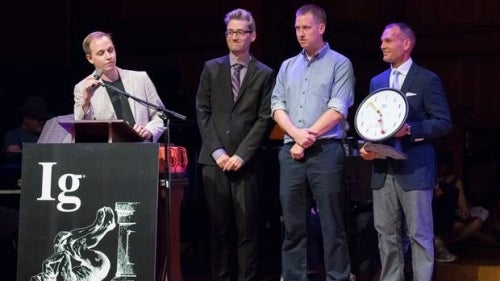
Researchers Gordon Pennycook, Derek Koehler, Nathaniel Barr and Jonathan Fugelsang accept their 2016 Ig Nobel prize at Harvard University for their University of Waterloo-based study called On the Reception and Detection of Pseudo-Profound Bullshit. (Photo by Howard Cannon for The Globe and Mail)
It’s a distinction that should make every straight-talking Canadian proud.
A team of University of Waterloo researchers has won the world’s cheekiest science price for their study of impressive-sounding rhetoric that turns out to be utter claptrap – a phenomenon better known by its technical name: bullshit.
The group was among those recognized on Thursday at the Ig Nobel Prize ceremony, a farcical extravaganza held annually at Harvard University that has the slightly less silly aim of celebrating research “that first makes people laugh and then makes them think.”
Cognitive psychologist Gordon Pennycook and his fellow researchers were named winners of this year’s Ig Nobel Peace Prize for their study entitled, “On the Reception and Detection of Pseudo-Profound Bullshit,” which was published last November in the research journal Judgment and Decision Making.
Other Ig Nobel winners included designer Thomas Thwaites, who created and donned a set of prosthetic limbs that allowed him to roam with a herd of goats (Biology Prize), and the late Egyptian urologist Ahmed Shafik, who studied the effects of wearing polyester, cotton or wool trousers on the sex lives of rats (Reproduction Prize).
“It feels so wonderful,” Dr. Pennycook said of winning the Ig Nobel, which comes without the money or the prestige of a Nobel Prize but which nonetheless confers a certain tongue-in-cheek form of scientific immortality on those who receive it.
Now based at Yale University, Dr. Pennycook said there was a serious side to the Waterloo team’s focus on bullshit – defined in the study as something that implies but does not contain adequate meaning or truth. “There’s obviously too much of it,” he said. “It’s a salient part of our everyday lives and so we should probably understand more about it.”
In one part of the study, subjects were asked to rate the profundity of various statements, including some that were deliberately meaningless. The results showed that subjects who were less likely to be analytical in their thinking and to base their responses on initial impressions were also more likely to consider the meaningless statements profound.
Derek Koehler, a senior researcher on the study, said the differences that emerged suggest it is not a subject’s ability to understand a sentence that matters but his or her willingness to think about it. “In some cases, gut instincts are all you need and may be appropriate to the task at hand,” Dr. Koehler said. “But, in other cases, you need to set those aside and reason in a more effortful way.”
In further experiments, subjects often did not distinguish between the relative profundity of meaningless statements and those drawn from the Twitter feed of Deepak Chopra, the New Age guru and best-selling author.
Asked what the practical applications of such research might be, Dr. Pennycook answered: “Have you been following the U.S. elections?”
The Waterloo study has been cited several times, including by a team of German researchers who correlated receptivity to bullshit statements with favourable views of U.S. presidential candidate Donald Trump, along with others who were vying for the Republican nomination earlier this year.
Marc Abrahams, the long-time master of ceremonies of the Ig Nobels and editor of the Annals of Improbable Research, said the work deserved the Peace Prize because “so much of the world’s turmoil always has been, and probably always will be, caused by bullshit. Anything that has a hope of cutting through some of that could potentially do more for peace between human beings than any diplomatic initiative.”
In his acceptance speech – prematurely cut off as per Ig Nobel tradition – Dr. Pennycook thanked Deepak Chopra and Dr. Oz along with a list of other personalities and politicians, tobacco lobbyists, climate-change deniers and creationists, adding, “Your quantum vibrations permeate the transcendent essence of true experience that coalesced into our bullshit … paper.”
Ivan Semeniuk - SCIENCE REPORTER The Globe and Mail